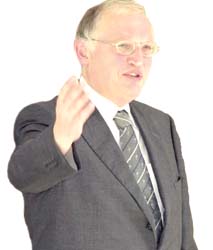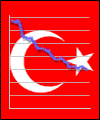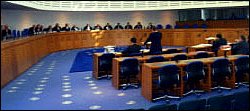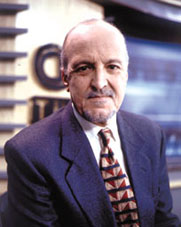15
February 2002
![]()
2. "Five injured in pro-Ocalan demonstration in Turkey", five people were injured in southeastern Turkey Thursday as police broke up a demonstration denouncing the capture of Kurdish rebel leader Abdullah Ocalan three years ago, the Anatolia news agency reported.
3. "EU urges Turkey to speed up reforms on death penalty, Kurdish rights", the European Union urged EU-hopeful Turkey Thursday to speed up democratic reforms, notably by abolishing the death penalty and granting the Kurdish minority the right to education in their mother tongue.
4. "Analaysis - A year on, tiff at the top still haunts Turkey", in a fit of pique, Turkey's president threw a copy of his country's constitution across the table towards his prime minister, triggering a financial meltdown that cost billions of dollars and put thousands out of work.
5. "European human rights court condemns Turkey in Kurd's death", the European Court of Human Rights on Thursday condemned and fined Turkey for the 1993 death of a young Turkish Kurd who died after being tortured by the country's police.
6. "Anti-EU circles launch a counterattack", those who do not want Turkey to be modernized and would rather keep it as an inward-looking, stunted country, keep up their attacks. Opinion by M. Ali Birand.
1. - AFP - "US leftist Noam Chomsky calls for autonomous Kurdistan":
DIYARBAKIR
US leftist Noam Chomsky said Wednesday he hoped for the creation
of an autonomous Kurdistan in the Middle East, uniting millions of Kurds
dispersed throughout several countries. The academic, a linguist, said
he hoped one day to see the existence of an independent Kurdistan, providing
millions of Kurds with a homeland. Chomsky was speaking at a symposium
of non-governmental organisations in Diyarbakir, the main town in Kurdish-populated
southeastern Turkey.
Chomsky also met representatives of the pro-Kurdish People's Democratic Party (HADEP), which risks being banned by Ankara for its links with the Kudish People's Party (PKK).
Chomsky said the inhabitants of an autonomous Kurdistan
would be both politically and culturally independent. Around 20 million
Kurds live in Turkey, Syria, Iraq and Iran, 12 million of them in Turkey.
Chomsky called for the Kurdish language to be taught in schools, saying
he had respect for the language and for those who wanted to be taught
their mother tongue. ![]()
2. - AFP - "Five injured in pro-Ocalan demonstration in Turkey":
DIYARBAKIR
Five people were injured in southeastern Turkey Thursday as police
broke up a demonstration denouncing the capture of Kurdish rebel leader
Abdullah Ocalan three years ago, the Anatolia news agency reported.
A group of demonstrators lit a fire in Siirt city to protest the event, and defied police orders to disperse, Anatolia said. Security forces moved into the group saying the demonstration was illegal, leaving five people injured, the agency said, without giving further details. Several other demonstrators were taken into police custody. Small groups of people also lit fires and shouted pro-Kurdish slogans in the streets of Diyarbakir, the center of the mainly Kurdish southeast, but police did not intervene, an AFP correspondent said.
Turkish agents captured Ocalan, the head of the Kurdistan Workers' Party (PKK), in Nairobi on February 15, 1999 after he left his refuge in Greek diplomatic compounds there, and brought him to Turkey the following day. Ocalan was condemned to death in June 1999 for treason, but Ankara suspended the execution of the sentence until the European Court of Human Rights rules on his complaints against Turkey.
Heeding Ocalan's peace appeals, the PKK announced in September
the same year it was ending its armed struggle for Kurdish self-rule
in southeast Turkey to seek a democratic resolution to the Kurdish conflict,
which has claimed some 36,500 lives since 1984. As a result, heavy fighting
in the region significantly diminished, but Turkey, which has downplayed
the PKK's peace bid, continues to hunt down the militants, whom it sees
as "terrorists." ![]()
3. - AP - "EU urges Turkey to speed up reforms on death penalty, Kurdish rights":
ANKARA
The European Union urged EU-hopeful Turkey Thursday to speed up
democratic reforms, notably by abolishing the death penalty and granting
the Kurdish minority the right to education in their mother tongue.
"The year 2002 will be an important, if not a crucial year, for the relations between the EU and Turkey," EU Enlargement Commissioner Guenter Verheugen told reporters here after talks with Foreign Minister Ismail Cem. "We expect that the next steps will address issues which were not addressed... in areas like the death penalty and education," he added.
Last October, Turkey, the laggard among 13 EU hopefuls, passed a set of constitutional amendments, among them the abolition of the death penalty except for times of war, imminent threat of war and terrorism. Under EU criteria, however, countries are required to abolish capital punishment for any crime. Turkey is also under pressure to grant Kurds the right to education in their mother tongue, but it fears that such freedom could fan nationalist sentiment and rekindle a recently diminished Kurdish rebellion for self-rule in the southeast.
Earlier this month, Turkey passed another package of reforms covering freedom of expression despite stiff opposition from the government's nationalist wing. But these were attacked as inadequate by the media, legal experts and NGOs and also drew criticism from Verheugen on Thursday. "In the Turkish context, of course, this is an improvement. If you see it in a purely western European context you will find some problems... you would expect the country (to be) more forthcoming," Verheugen said.
"I understand that a country is not like a racing car, but you can accelerate from zero to 100 miles per hour in a couple of seconds," he added. The commissioner also said the EU would be watching how the reforms are implemented. Cem acknowledged that there were "some difficulties, some problems, some ups and downs" in Turkey's reform process, but said both sides agreed that "the trend is positive." He said Ankara was aiming to have dates set in 2003 for the start of its accession talks, but Verheugen said: "The timing depends on the progress that will be made here in the country."
The two sides expressed support for peace talks between the Turkish- and Greek-Cypriot communities in Cyprus to end the Mediterranean island's 28-year division, a thorn in the EU enlargement process. The European Union has expressed hope that a unified Cyprus will join the 15-nation body. Verheugen praised Turkey for organizing a meeting this week between the EU and the Organization of the Islamic Conference to promote Muslim-Christian tolerence after September 11.
"The meeting in Istanbul clearly showed the added
value that Europe will get from Turkey as a member of our family. It
demonstrated that Turkey has something to offer that nobody else in
Europe could give," he said. Turkey is the only Muslim-dominated
candidate for EU membership. Verheugen also met with Prime Minister
Bulent Ecevit and was scheduled to have talks with his deputy Mesut
Yilmaz, who holds the EU affairs portfolio, and other officials later
on Thursday. ![]()
4. - Reuters - "Analaysis - A year on, tiff at the top still haunts Turkey":
ISTANBUL / by Steve Bryant
In a fit of pique, Turkey's president threw a copy of his country's
constitution across the table towards his prime minister, triggering
a financial meltdown that cost billions of dollars and put thousands
out of work.
A year later, the image of that flying booklet and of the premier storming out to declare a "serious crisis" still haunts the nation. But the constitution itself and the laws it anchors have seen major changes under pressure from international lenders and the European Union that Turkey seeks to join.
Banning of political parties, the scourge of Turkish democracy, was made harder, obstacles to Kurdish broadcasting were removed and curbs on freedom of speech were eased; not, perhaps, all the EU would want, but unprecedented for Turkey.
Laws were passed reforming the tobacco industry, the ailing banking sector, public procurement procedures that had long been a seat of corruption, electricity, telecoms and the inefficient and over-subsidised farming system.
"Much has been done over the last year, they've pushed a lot through parliament," said one experienced Western diplomat. "But the proof of the pudding in the economy and elsewhere will be in the implementation."
The pace of reform imposes its strains on an unlikely coalition few thought could survive when it was formed from Prime Minister Bulent Ecevit's Democratic Left Party (DSP) and erstwhile nationalist foes in May 1999.
EMOTION
The fear never leaves Turkish markets that politicians may clash again -- Ecevit and his president, Ecevit and his coalition partners -- and unleash strains that still exercise the economy.
The ability of the two stubborn statesmen to bridge the personal gulf between them could define Ecevit's government and the success of its $16 billion IMF crisis lending programme.
"I think (problems between them) will continue from time to time. (President Ahmet Necdet) Sezer is a good man and honest but he's also stubborn. You can't change his mind easily," said Mustafa Erdogan, professor of constitutional law at Hacettepe University in Ankara.
Analysts agree the economy's dire condition would have surfaced anyway, but perhaps not with the same drama, had Sezer and Ecevit held their peace on February 19, 2001.
"Prime Minister Ecevit was very emotional when he walked out -- hardly the way a wise and serious politician should act," said Sami Kohen, columnist for the Milliyet newspaper.
The IMF and Turkey agree the country will now not regain its 2000 gross national product of $201 billion until 2004.
WASTED TIME
"The president at that time was a newcomer to Turkish politics. He did not realise a president should be more balanced and sober," said Kohen. "Now their relationship, if not cordial, is at least fair and normal."
But that does not guarantee easy passage of IMF or EU reform laws through the eagle-eyed scrutiny of Sezer, a former judge.
Investors wait nervously each time reform laws reach Sezer's desk for ratification.
Sezer has vetoed a number of IMF-backed laws on the legal technicalities his experience as a top judge has taught him are important. The exasperated government has then reaffirmed the laws in a second vote, overriding the veto.
"Time has been wasted. And particularly on economic matters the IMF has no time to waste," said Kohen.
Sezer vetoed a law on the tobacco industry and, more recently, part of a banking law directly linked to a pending IMF loan.
"President Sezer is not against reforms, he has said on various occasions that he is for change... but he has been trained and grew up with legal considerations," said Kohen.
While markets still flinch at any suggestion of conflict between Sezer and Ecevit, the government is another source of concern. The MHP, and others, may balk at the social pain resulting from implementation of financial measures.
They are also jealous guardians of concepts of "national unity" and the restrictions that go with it.
This month, Ecevit's rightist Nationalist Action Party (MHP) allies voted for the first time as a bloc against government legislation to ease curbs on freedom of expression.
The reforms are seen as modest by European officials, symptomatic of Turkish reluctance to ease state controls. Fundamental change may take some time yet.
Ozdem Sanberk, head of the TESEV social research foundation, however, is more sanguine perhaps than the markets. The alliance is a marriage of necessity, both parties facing crippling losses if elections were to be held today.
"The strength of the coalition may be in its fragility,"
he said. "There is no obvious alternative for either." ![]()
5. - AFP - "European human rights court condemns Turkey in Kurd's death":
STRASBOURG
The European Court of Human Rights on Thursday condemned and fined
Turkey for the 1993 death of a young Turkish Kurd who died after being
tortured by the country's police.
Abdulselam Orak, 23, died of a stroke in June 1993, two weeks after being arrested on suspicion of involvment with the outlawed Kurdistan Workers' Party (PKK). The court sided with the victim's father, who charged the Turkish security
forces with torturing his son and failing to provide him with medical attention.
It rejected the government's argument that Orak died of injuries incurred during an escape attempt. "The government had not supplied any plausible explanation for the areas of bruising found, among other places, on A.O.'s arms and thighs, the soles of his feet, the top and sides of his head or of the scratches on his genitals," the ruling said.
The court found Turkey guilty of violating several European
human rights laws, including the right to life and the ban on torture.
It ordered Turkey to pay 68,500 euros (59,600 dollars) to Orak's heirs
and 4,000 euros (3,500 dollars) to his father, the plaintiff. European
human rights bodies have repeatedly condemned Turkey's prison and police
systems, noting that lack of respect for human rights, in addition to
its reinstatement of the death penalty and its harsh treatment of the
Kurdish minority, continued to prevent it from joining the European
Union. ![]()
6. - Turkish Daily News - "Anti-EU circles launch a counterattack":
Opinion by M. Ali Birand
Those who do not want Turkey to be modernized and would rather keep
it as an inward-looking, stunted country, keep up their attacks. The
way the EU representative's e-mails have been stolen and published is
the most typical example of that. Brussels has been relieved to some
extent thanks to Ismail
Cem's statement and the prosecutors taking action
Those circles who do not want Turkey to open up to the world, develop its relations with the West and become a real power in the region, have stepped up their attacks on the European Union.
The Ankara representation office of the EU is a diplomatic mission. It has diplomatic immunity. The e-mail messages of that mission were recently "stolen" by hackers whose identity is not known. This is no different from telephone tapping or the placing of bugs. This is a crime everywhere in the world.
These persons have given their findings to a small group who think that politics is blackmailing people. And that group has been trying to create a sensation by releasing a few of these e-mail messages every day. Without any such incident no one would have talked about them. Since they know that, they are now trying to kick up a storm.
The e-mail in question involves, among other things, the communications between the EU mission and a number of journalists, including me.
The funny thing is, these strictly business communications are being described in an "EU gang" context, and EU representative Karen Fogg is being named as the ringleader.
This issue became more serious when Daily Milliyet editor-in-chief Mehmet Yilmaz pointed out that the shadow state is behind this incident.
The Foreign Ministry had acted timidly until Wednesday. They contented themselves with saying: "Well, what can we do? We have informed the prosecutors. They will take due steps." They even whispered about their anger at Karen Fogg. They may have no sympathy for Karen Fogg as a person, but they could not possibly be so narrow-minded as to fail to take seriously the "robbing" of a diplomatic mission in this manner. This may be done to a Turkish ambassador as well one day.
Indeed, becoming aware of the gravity of the situation, Foreign Minister Ismail Cem finally roared. He announced that this was an "ugly" case of "theft."
On the same day, the prosecutor's office moved.
What kind of attitude will the state take, thinking about the possibility that this may happen to it as well some day in some other country? Will it follow it up to the end? Will it punish those responsible?
Two points seem to be forgotten.
The first one involves the real function of the ambassadors.
If you are the representative of Turkey or any other country, you would be assigned the duty of contacting the members of the press in the host country, obtain their views, and relay to them your own views. The Turkish ambassadors too fulfil this function.
Similarly, they contact the nongovernmental organizations. They provide some of these with support. You may remember that when Clinton visited Turkey as the U.S. president he contacted certain nongovernmental organizations which the state views as an enemy. We were surprised to see that. It was at that time that we came face to face with the realities.
Interpreting Karen Fogg's activities as a "gang activity," and describing those who have had contact with her as "gang members" is simply ridiculous, a sensation-mongering effort aimed at disrupting Turkey's relations with the EU.
Those who are afraid of Turkey's moving closer to the EU and those who fear enlightenment, are the same persons. They want this country to remain inward-looking, insecure, fearful and stunted.
However, regardless of whatever they do, they will not accomplish that. They will not be able to keep Turkey in the dark.
Brussels relieved on the last day
Brussels and the 15 capital cities were greatly upset by the way the Foreign Ministry remained indifferent to the theft from the EU mission, taking a timid stance. Even the talks EU commissioner Verheugen starts in Ankara today were expected to come under the shadow of this crisis. However, Brussels was relieved yesterday when Foreign Minister Ismail Cem finally roared and the prosecutors took action.
Last Monday a demarche was made with the Turkish permanent
delegate. On Wednesday morning a protest letter was sent to Ankara amid
news reports indicating that the 15 member countries were being stirred
into action. Yet, on Wednesday afternoon, that is, immediately before
Verheugen left for Ankara, the situation changed. On the other hand,
the letter theft has caused undue tensions anyway. ![]()